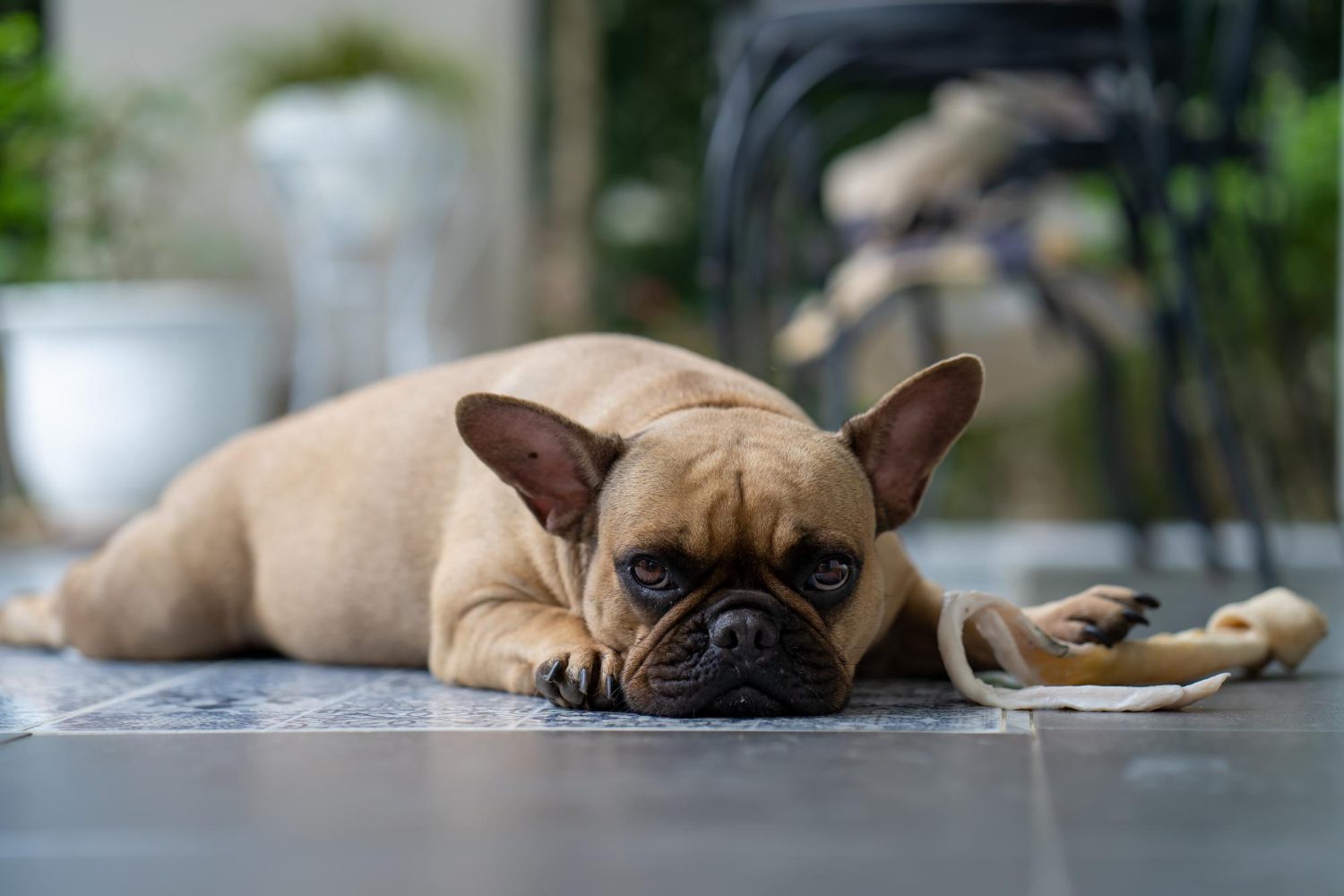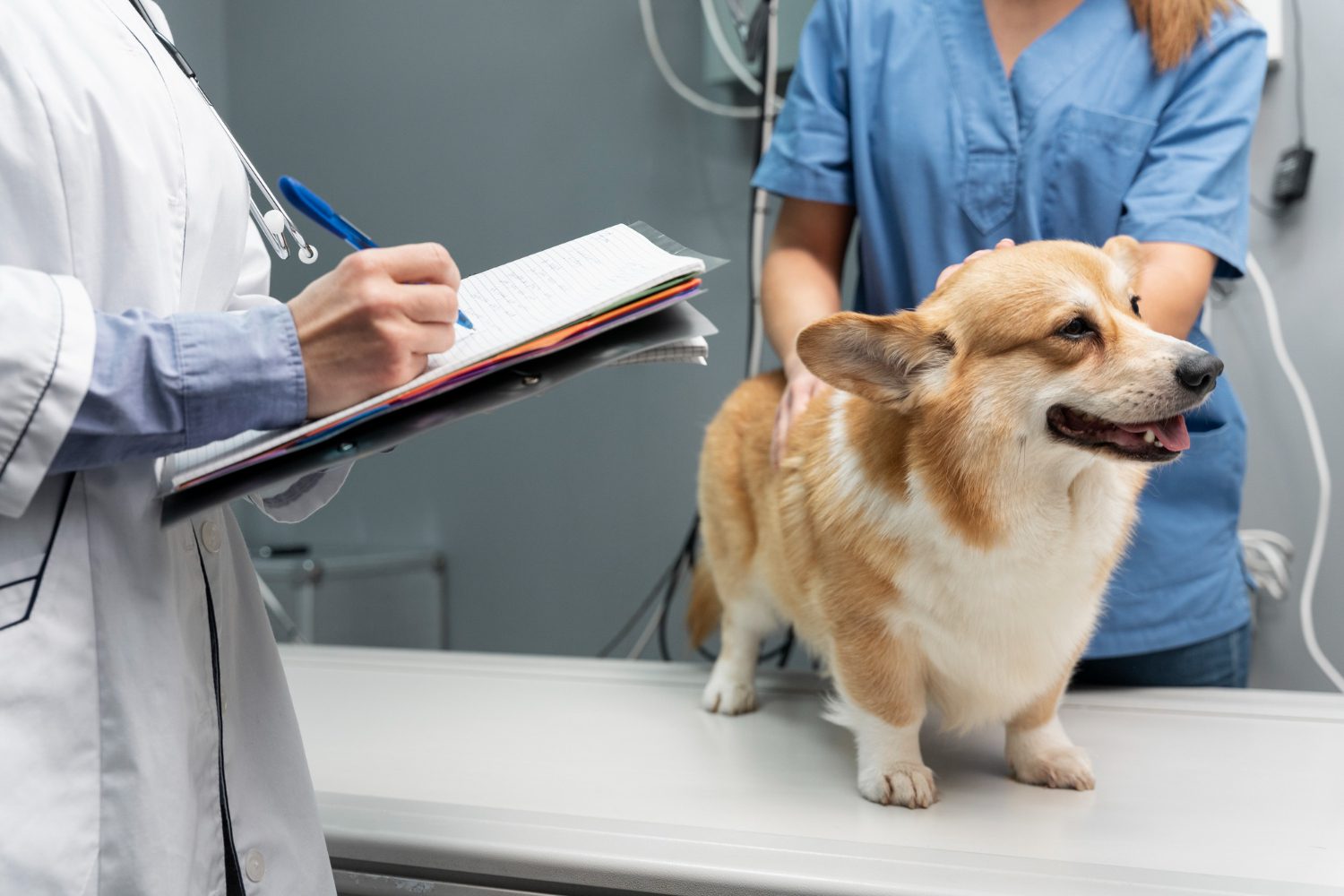Mucus in Dog Poop: Causes and Treatments

By Evelyn Harcourt
September 02, 2025 - 1 min read
If your dog passes poo that looks like snot or slime, it is most likely mucus. Mucus can be mixed in with the poop or deposited on its surface.
A little mucus is normal, and it lubricates the digestive tract. However, if your dog suddenly passes a lot of it, this indicates a medical issue.
This article discusses the various causes of mucus in poop, the additional symptoms that may be seen, when you’ll need to see a vet, and the treatment options. Importantly, we also examine how you can prevent this issue in the future.

What is Mucus in Dog Poop?
Mucus in dog poop is a jelly-like substance that is usually pale yellow or transparent. It is gloopy and snotty and adheres closely to the stool.
Normal vs. Abnormal Mucus
A little bit of mucus is not a sign that there is something wrong. A normal and healthy gut will produce some mucus. This is the body’s natural way to lubricate the intestinal tract, so stool can easily pass through.
Mucus also lines the gut and acts as a protective layer, shielding it from bacteria, viruses, and toxins.
A large amount of mucus or mucus visible alongside other signs, such as diarrhoea or blood passing, indicates a medical issue.
Why Mucus Appears in Stool
A large amount of mucus indicates that the lower gut is inflamed. Colitis is an inflamed lower gut (colon) and one of the key signs is excessive mucus being produced by the goblet cells in the gut epithelium.
Common Causes of Mucus in Dog Poop
Figuring out why your dog has lots of mucus in its poop isn’t always straightforward, as there are frequently several factors involved.
Dietary Changes
An abrupt diet change, particularly in a dog with a sensitive stomach, is a common trigger for colitis and mucus in the stool.
When diet changes are made, this must be done so gradually over several days. For a pup, a transition period of a week is advised.
Food Intolerance or Allergies
Certain foods can trigger gut inflammation in some dogs. Some of the more common canine food triggers include dairy, chicken, beef, eggs, and grains.
Dogs can start reacting to ingredients they previously tolerated, and often, symptoms begin between the ages of one and three.
Gastrointestinal Infections
Viral, bacterial, and even fungal infections of the GI tract can cause signs such as mucus stool, diarrhoea, vomiting, bloating, and flatulence.
Common causes of gastroenteritis include eating contaminated raw food, drinking from puddle water, and exposure to other affected animals' stools.
Parasites and Worms
Intestinal parasites such as Giardia and Coccidia, as well as worms like roundworms and tapeworms, have the potential to cause slimy stool.
As dogs are at high risk of contracting parasites, vets regularly recommend routine dewormers.
Inflammatory Bowel Disease (IBD)
Chronic stool issues may be linked to an ongoing inflammation in the gut, such as that caused by IBD. This complex condition in the dog can sometimes prove tricky to diagnose and manage.
Stress and Anxiety
Stress is a well-known trigger for colitis, and some of the more frequent sources of stress in a dog’s life include being kenneled, a trip to the vets, or being away from their owner for a prolonged time.
Those with phobias of fireworks and storms may also experience mucus in their stool shortly after these events.

Symptoms That Accompany Mucus in Dog Poop
Although mucus in poop can occur as a symptom by itself, it is usually accompanied by other signs.
Blood in Stool
An inflamed gut tends to bleed, and seeing fresh red blood in the poo is not uncommon during a bout of colitis.
If the bleeding is higher up in the gastrointestinal tract (such as in the foodpipe or stomach), the digested blood appears black and tarry in the stool.
Diarrhoea or Constipation
Many affected dogs also have loose stool, as the excrement moves quickly through the inflamed and irritated bowels.
Constipation can occur, but it is much less common. Those who are constipated may strain repeatedly and have a visibly bloated abdomen.
Vomiting and Loss of Appetite
Some of these dogs feel sick, vomit, and eat less. This is a consequence of the inflammation that occurs all along the digestive tract, including the stomach.
Any abdominal cramping or bloating will also negatively affect appetite.

When to See a Vet for Mucus in Dog Poop
A little mucus now and then would not necessitate a trip to the vet, but sometimes, a visit is warranted.
This is the case if the mucus is an ongoing issue or if your dog has other symptoms such as vomiting, lethargy, or food refusal.
Warning Signs of a Serious Condition
Consult your local emergency veterinarian if your dog is not coping well. Signs of trouble can include obvious lethargy, weakness, persistent vomiting, pale gums, or a loss of more than a few drops of blood in the stool.
How Vets Diagnose the Cause
If this is your dog’s first time passing mucus in their stool, your vet may not run any specific tests.
Most patients respond quickly to symptomatic care, and testing would not be needed. However, diagnostic tests are essential if the issue persists, recurs, or your dog is not improving.
Some of the more common diagnostics carried out include a biochemistry blood test, including an intestinal profile, a pooled stool sample, and an abdominal scan.
For diagnosing IBD or intestinal lymphoma, for example, your vet may recommend an endoscopy or exploratory laparotomy and biopsies.

Treatment Options for Mucus in Dog Poop
There are lots of remedies that can be started from home, once you see any mucus in the poop.
Dietary Adjustments
Opt for a very digestible and low-fat diet. Many vets advise giving unskinned chicken breast, lean turkey meat, or white fish alongside rice or sweet potato.
Some dogs do best on a long-term prescription diet that is low in fat. Feeding little and often may be preferable to feeding one large meal a day.
Medications and Supplements
Both prebiotics and probiotics are crucial in supporting gut health and creating a stronger gut barrier. They should be given daily.
Some dogs require prescribed medicine in order to control symptoms. This is the case for those with IBD, who can benefit from drugs such as corticosteroids and antibiotics.

Home Care and Monitoring
Owners are advised to keep a close eye on their pet while passing mucus, to ensure they are coping well.
Keeping a Stool Diary
If this is happening regularly, it makes sense to keep track of when the bouts are happening and if there is a pattern.
In the diary, include the appearance of the stool, the food eaten, and any environmental stressors.
Ensuring Proper Hydration
If your dog has loose or frequent stools, it will be losing more fluids than usual. Provide plenty of fresh water and consider also offering an electrolyte solution or some dog-safe bone broth.
Preventing Mucus in Dog Poop
Some lifestyle changes can be useful if your dog is prone to passing mucus.
Balanced Diet and Gradual Food Changes
Stick to a diet that suits your dog. The ideal diet for one may trigger a bout of colitis in another.
Some dogs require a hydrolysed food, whereby the proteins are broken down so small that the immune system does not recognise them.
Any diet change should be made slowly over several days. If your dog develops symptoms, slow down the transition.
Stress Reduction
You can’t guarantee your dog will never feel stressed, but some things can help.
For example, if your dog has separation anxiety, you may be able to use a dog sitter or avail yourself of doggy daycare when you need to be away.
Dogs who have chronic anxiety benefit greatly from a lifestyle that includes lots of exercise and mental enrichment.
It is also worth considering some natural calming supplements or, in some cases, prescribed anxiolytics.
Parasite Prevention
It is sensible to ensure your dog is up to date with its wormer, even in its senior years.
Depending on your dog’s lifestyle, your vet may want it to have regular flea, lungworm, and tick prevention.

Learn More About Mucus in Dogs' Poop
If you’re concerned for your dog or have any questions about its symptoms, don’t hesitate to contact our team today.
Mucus in Dog Poop FAQs
Can Mucus in Dog Poop Go Away on Its Own?
Yes, it can. For most dogs, an episode of mucus in the stool will be short-lived and resolve without intervention.
Is Mucus in Dog Poop Always a Sign of Illness?
No, not at all. A little mucus is always present in the stool and seeing it does not mean your dog is unwell. However, lots of mucus or mucus that is present alongside other symptoms, could mean there is a medical problem.
What Should I Bring to the Vet if My Dog Has Mucus in Stool?
It can be helpful to bring a sample of your dog’s stool or a photo. If you have kept a diary outlining recent episodes, do bring this along too.
Continue reading

Rabbit Haemorrhagic Disease (RHD): What to Do
Learn what Rabbit Haemorrhagic Disease is, the symptoms to watch for, and what to do next.
Read article
Dog Back Pain: Symptoms and Treatment
Discover the symptoms, causes, and treatments of dog back pain and when to see a vet.
Read article
What is the Best Pain Relief for Dogs?
Explore safe pain relief options for dogs, including treatments, signs, and vet guidance.
Read article